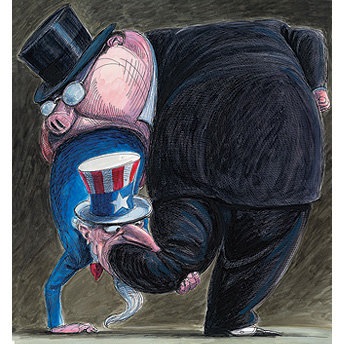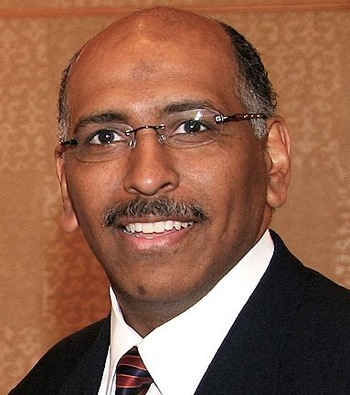Some fun warnings about Clinton’s 1993 (remember 1993?) deficit reduction package, via Congress Matters. How did that work out, again?
Rep. Robert Michel (R-IL), Los Angeles Times, 5/28/93: They will remember who let loose this deadly virus into our economic bloodstream.
Rep. Newt Gingrich (R-GA), GOP Press Conference, House TV Gallery, 8/5/93: I believe this will lead to a recession next year. This is the Democrat machine’s recession, and each one of them will be held personally accountable.
Rep. John Kasich (R-OH), 8/5/93: Do you know what? This is your package. We will come back here next year and try to help you when this puts the economy in the gutter…
Rep. John Kasich (R-OH), CNN, 7/28/93: This plan will not work. If it was to work, then I’d have to become a Democrat…
Rep. Robert Dornan (R-CA), 8/5/93: The problem with our economy is that there is too little employment and too little growth. This plan will do nothing to improv that condition and will actually make it worse.
Rep. Christopher Cox (R-CA), 5/27/93: This is really the Dr. Kevorkian plan for our economy.
Rep. Thomas Ewing (R-IL), 8/5/93: …This bill is a disaster waiting to happen.
Rep. Jim Ramstad (R-MN), 3/17/93: …will stifle economic growth, destroy jobs, reduce revenues, and increase the deficit.
Rep. Phil Crane (R-IL), 3/18/93: …a recipe for economic and fiscal disaster.
Rep. John Kasich (R-OH), CNN, 7/28/93: …We have a stagnant economy and there is nothing down the road that makes it look like we’re going to have the kind of economic growth that puts people to work.
Rep. Dick Armey (R-TX), CNN, 8/2/93: The impact on job creation is going to be devastating, and the American young people in particular will suffer a fairly substantial deferment of their lives because there simply won’t be jobs for the next two to three years to go around to our young graduates across the country.
Rep. John Kasich (R-OH), 5/27/93: …your economic program is a job killer.
Rep. Dick Armey (R-TX), 8/5/93: The economy will sputter along. Dreams will be put off and all this for the hollow promise of deficit reduction and magical theories of lower interest rates. Like so many of the President’s past promises, deficit reduction will be another cruel hoax.
Rep. Wally Herger (R-CA), 8/4/93: The simple fact is that the Clinton plan will not lower interest rates. It will not lower inflation. It will not create jobs. And it will no lower the deficit. The Clinton tax plan will spur inflation, lose jobs, increase the deficit, and hurt our economic growth.
Rep. Deborah Pryce (R-OH), 5/27/93: The votes we will take today will not be soon forgotten by the American voter. [They] will lead to more taxes, higher inflation, and slower economic growth.
Rep. John Kasich (R-OH), GOP News Conference, Senate Gallery, 8/3/93: Come next year… we’re going to find out whether we have higher deficits, we’re going to find out whether we have a slower economy, we’re going to find out what’s going to happen to interest rates, and it’s our bet that this is a job killer.
Rep. Dick Armey (R-TX), CNN, 8/2/93: Clearly this is a job killer in the short run. The revenues forecast for this budget will not materialize; the costs of this budget will be greater than what is forecast. The deficit will be worse, and it is not a good omen for the American economy.
Rep. Jim Bunning (R-KY), 8/5/93: It will not cut the deficit. It will not create jobs. And it will not cut spending.
Rep. Dick Armey, CNN, 2/18/93: I will tell you, this program will not give you deficit reduction. It will be a disaster for the performance of the economy.
Rep. Clifford Stearns (R-FL), 3/17/93: …It will be the kind of impact that this country can’t absorb. It will slow economic growth, contribute to the massive federal deficit….
Rep. Joel Hefley (R-CO), 8/4/93: …It will raise your taxes, increase the deficit, and kill over one million jobs.
 In the movie Lars and the Real Girl, the main character imagines that a female blow-up doll is his fiancée. To humor Lars, his brother and sister-in-law go along with the charade. Over the course of the movie, more people are drawn into the circle, until eventually the whole town is treating Bianca the blow-up doll as one of its leading citizens. …
In the movie Lars and the Real Girl, the main character imagines that a female blow-up doll is his fiancée. To humor Lars, his brother and sister-in-law go along with the charade. Over the course of the movie, more people are drawn into the circle, until eventually the whole town is treating Bianca the blow-up doll as one of its leading citizens. … … In essence, Paulson and his cronies turned the federal government into one gigantic, half-opaque holding company, one whose balance sheet includes the world’s most appallingly large and risky hedge fund, a controlling stake in a dying insurance giant, huge investments in a group of teetering megabanks, and shares here and there in various auto-finance companies, student loans, and other failing businesses. Like AIG, this new federal holding company is a firm that has no mechanism for auditing itself and is run by leaders who have very little grasp of the daily operations of its disparate subsidiary operations.
… In essence, Paulson and his cronies turned the federal government into one gigantic, half-opaque holding company, one whose balance sheet includes the world’s most appallingly large and risky hedge fund, a controlling stake in a dying insurance giant, huge investments in a group of teetering megabanks, and shares here and there in various auto-finance companies, student loans, and other failing businesses. Like AIG, this new federal holding company is a firm that has no mechanism for auditing itself and is run by leaders who have very little grasp of the daily operations of its disparate subsidiary operations. Sir Allen Stanford may be on the run today facing an $8 billion fraud charge. But back in the beginning of this decade he was pouring tons of money into Washington to help block a series of bills that would have created problems for his Antigua-based off-shore banking empire, which now appears to have been a massive fraud.
Sir Allen Stanford may be on the run today facing an $8 billion fraud charge. But back in the beginning of this decade he was pouring tons of money into Washington to help block a series of bills that would have created problems for his Antigua-based off-shore banking empire, which now appears to have been a massive fraud.

